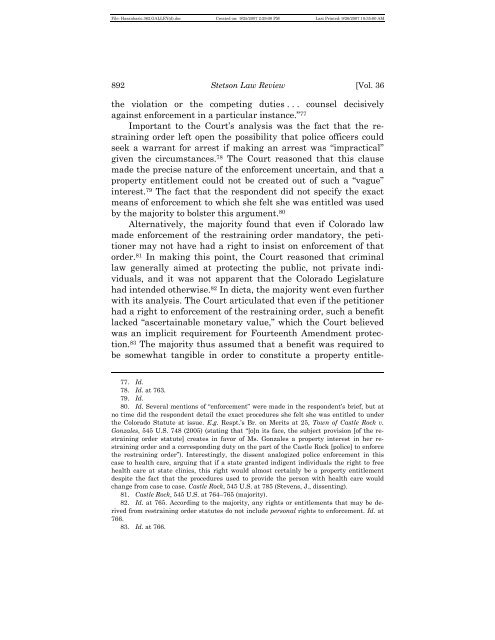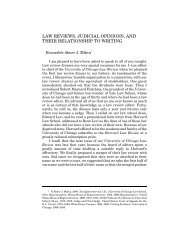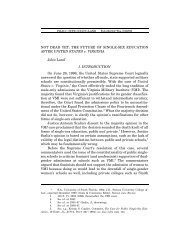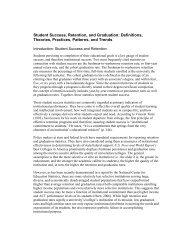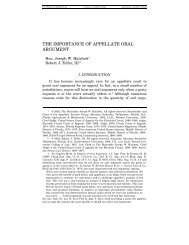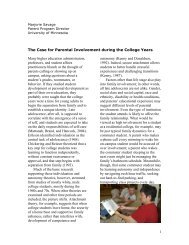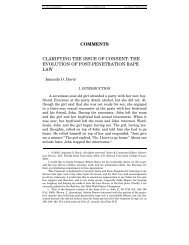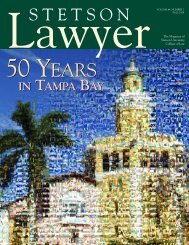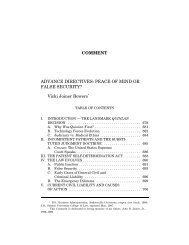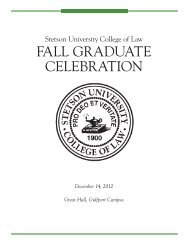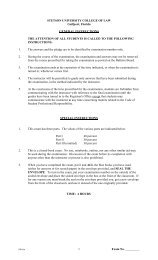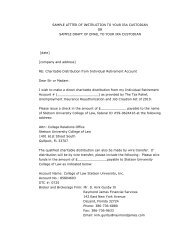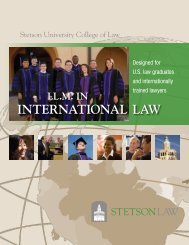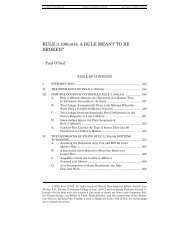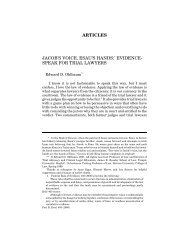TOWN OF CASTLE ROCK v. GONZALES: THE ... - Stetson University
TOWN OF CASTLE ROCK v. GONZALES: THE ... - Stetson University
TOWN OF CASTLE ROCK v. GONZALES: THE ... - Stetson University
Create successful ePaper yourself
Turn your PDF publications into a flip-book with our unique Google optimized e-Paper software.
File: Hasanbasic.362.GALLEY(d).doc Created on: 9/25/2007 2:29:00 PM Last Printed: 9/26/2007 10:35:00 AM892 <strong>Stetson</strong> Law Review [Vol. 36the violation or the competing duties . . . counsel decisivelyagainst enforcement in a particular instance.” 77Important to the Court’s analysis was the fact that the restrainingorder left open the possibility that police officers couldseek a warrant for arrest if making an arrest was “impractical”given the circumstances. 78 The Court reasoned that this clausemade the precise nature of the enforcement uncertain, and that aproperty entitlement could not be created out of such a “vague”interest. 79 The fact that the respondent did not specify the exactmeans of enforcement to which she felt she was entitled was usedby the majority to bolster this argument. 80Alternatively, the majority found that even if Colorado lawmade enforcement of the restraining order mandatory, the petitionermay not have had a right to insist on enforcement of thatorder. 81 In making this point, the Court reasoned that criminallaw generally aimed at protecting the public, not private individuals,and it was not apparent that the Colorado Legislaturehad intended otherwise. 82 In dicta, the majority went even furtherwith its analysis. The Court articulated that even if the petitionerhad a right to enforcement of the restraining order, such a benefitlacked “ascertainable monetary value,” which the Court believedwas an implicit requirement for Fourteenth Amendment protection.83 The majority thus assumed that a benefit was required tobe somewhat tangible in order to constitute a property entitle-77. Id.78. Id. at 763.79. Id.80. Id. Several mentions of “enforcement” were made in the respondent’s brief, but atno time did the respondent detail the exact procedures she felt she was entitled to underthe Colorado Statute at issue. E.g. Respt.’s Br. on Merits at 25, Town of Castle Rock v.Gonzales, 545 U.S. 748 (2005) (stating that “[o]n its face, the subject provision [of the restrainingorder statute] creates in favor of Ms. Gonzales a property interest in her restrainingorder and a corresponding duty on the part of the Castle Rock [police] to enforcethe restraining order”). Interestingly, the dissent analogized police enforcement in thiscase to health care, arguing that if a state granted indigent individuals the right to freehealth care at state clinics, this right would almost certainly be a property entitlementdespite the fact that the procedures used to provide the person with health care wouldchange from case to case. Castle Rock, 545 U.S. at 785 (Stevens, J., dissenting).81. Castle Rock, 545 U.S. at 764–765 (majority).82. Id. at 765. According to the majority, any rights or entitlements that may be derivedfrom restraining order statutes do not include personal rights to enforcement. Id. at766.83. Id. at 766.


